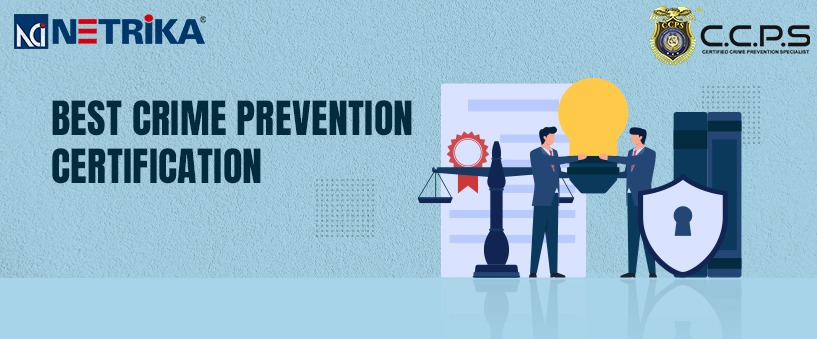News & Events
Best Crime Prevention Certification
- July 28, 2023
- Posted by: marketing@netrika.com
- Category: Blogs

With community, organizational and individual safety at stake, owing to the increasing crime in a sophisticated landscape, crime prevention is gradually becoming a priority component of national plans. The basic concept of crime prevention is based on the assumption that victimization due to crime is caused by a variety of circumstances. Criminal acts at an organization include, but are not limited to the loss of lives or tangible objects, as well as physical and digital theft. Furthermore, the criminal contributing causes may vary from the situations influencing their growing days to the local environment and possibilities that swept them into the violating behaviors.
With budgetary limits, management pressure, and a diverse population of employees, suppliers, and customers, the ideas and abilities involved with crime prevention have taken on a unique dimension of importance never before seen and never more necessary than now. This highlights the vitality of leveraging the benefits of the best certified crime prevention specialist programs. The certified crime prevention specialist studies teach security professionals not only how to detect crime and criminal intent, but also how to develop great mitigating mechanisms to prevent crime before it occurs.
Certificate in Crime Prevention Studies (CCPS) is one such course that covers a wide range of industries, including manufacturing, logistics, transportation, and service industries, as well as hotels, malls and complexes, and sensitive establishments. The primary focus of the program is the identification, recognition, and assessment of a crime risk, as well as the implementation of activities to eliminate or minimize crime. This crime prevention specialist program teaches professionals versatility, flexibility, adaptability, and adaptability, which will help them reimagine their approach to crime prevention.
A certified crime prevention specialist requirements, functions and responsibilities
- A certified crime prevention specialist leads an organization or nation to security by identifying crime and criminal intent and allowing the organization to develop excellent mitigating mechanisms to prevent crime before it occurs.
- A trained crime prevention specialist has the risk management capabilities to establish an environment in which completely eliminating crime is not an implausible strategy. However, building security procedures to protect against prospective, expected criminal acts can aid in their reduction.
The Certificate in Crime Prevention Studies will expose students to the most recent crime assessment and audit processes and methodologies, which can be tailored and improved to be implemented in their organizations for the management of crime prevention strategies, processes, and procedures. The culture of working in cohesion and collaboration with and among other departments and personnel, as well as law enforcement agencies, in crime prevention initiatives planned for both public and private businesses in a variety of settings necessitates transferable action for real-world experience.
A qualified crime prevention professional uses the following intelligence analyses to:
- Determine the level of criminal risk by evaluating the threat sensitive locations. A qualified crime prevention specialist is skilled at both quantitative and qualitative analysis, which is required for the successful completion of this assignment. This usually entails statistical sampling and data extrapolation.
- Identifies unusual activity of prospective threats by first classifying them as suspects, tracking their transaction history, and paying special attention to trigger warnings such as spending sprees or account balance exhaustion. It may also include the mapping of psychological conduct or the fabrication of a fake past.
A certified crime prevention specialist is skilled in technical tools and methodologies, and they apply their training and industry knowledge to identify patterns of attitudes and behaviors aimed at minimizing the threat of crime. Furthermore, they tend to improve the sense of safety and security, which favorably influences the quality of life in society and creates an atmosphere in which crime cannot thrive.

